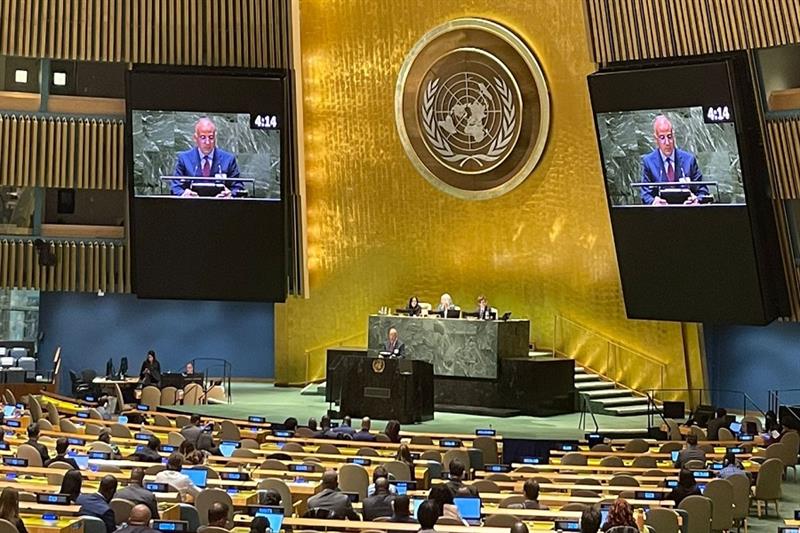

Egypt’s Minister of Water Resources and Irrigation Hani Sewilam speaking on Wednesday evening at the UN 2023 Water Conference in New York. (Photo courtesy of Egyptian Cabinet)

The minister’s remarks came on Wednesday at the UN 2023 Water Conference – the first UN water conference in a generation – held in New York on 22-24 March.
Sewilam referred to the Grand Ethiopian Renaissance Dam (GERD) that Addis Ababa has been building on the Blue Nile since 2011.
He said that the building of the dam has been ongoing “with no consultation and without conducting adequate studies on safety or its economic, social and environmental effects on the riparian countries”.
Sewilam said that Ethiopia has unilaterally begun the GERD’s building, filling and operating process.
“These unilateral, non-cooperative practices violate international law, including 2015’s Declaration of Principles and are not inconsistent with 2021’s Security Council presidential statement. Moreover, their continuation could pose an existential threat to 150 million citizens [of Egypt and Sudan]…and could have a disastrous effect,” he said.
The Egyptian minister said that continuing such practices in operating an “oversized dam” during a prolonged drought might lead Egypt to lose nearly 15 per cent of its agricultural lands and cause more than 1.1 million people to exit the labour market.
“This will consequently be linked to risks of increasing social and economic tensions and exacerbating irregular migration,” Sewilam said, adding that the practices could double Egypt’s food import bill.
More than 98 per cent of Egypt’s renewable waters flow from the River Nile, 75 per cent of which meet the nutritional needs of the 104.7 million Egyptians through agricultural production, he said.
Egypt suffers from a situation of water scarcity that is unique internationally, Sewliam said.
On the one hand, he said, Egypt is at the top of the list of arid countries since Egypt has the lowest rainfall rate globally.
On the other hand, Sewilam went on, Egypt’s annual share of water has reached 500 m3 per person at a time when the United Nations defines water scarcity at 1,000 m3 of water per person per year.
The Egyptian minister noted that such scarcity in water occurs in a country where agriculture represents the livelihood source for more than 50 per cent of the population.
He highlighted that Egypt has a water deficit of up to 55 per cent of its water needs, which is 120 billion cubic metres.
“Egypt is making huge investments to raise the efficiency of its water system, which exceeded $10 billion during the previous five-year plan. However, it also reuses water several times in this framework and is forced to trade in huge food imports worth about $15 billion,” Sewilam said.
In light of the preceding, he said, practical transboundary water cooperation is an existential and indispensable matter for Egypt.
According to Sewilam, for such cooperation to be practical, management of shared waters must proceed at the level of the “basin” as an integrated unit.
He noted that Egypt adheres at the regional level to the importance of adopting the rules of cooperation that consider the interests of all parties, therefore including all parties.
Sewilam stressed that consultations taking place in this context should be based on sound scientific foundations to ensure fairness and avoid significant harm.
The UN Water Conference – co-hosted by the governments of the Netherlands and Tajikistan – aims to raise awareness of the global water crisis and decide on actions to achieve internationally agreed water-related goals.
Short link:






GIPHY App Key not set. Please check settings